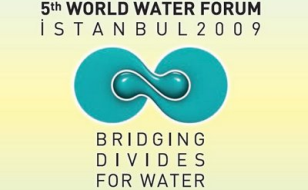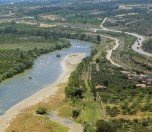The mainstream media is presenting the fifth World Water Forum (WWF), held in Istanbul this year, as a meeting aimed at finding solutions to the world’s water problems. However, geological engineer Tahir Öngür, a member of the No to Commercialisation of Water Platform says that the opposite is the case.
Members of forum are self-interested
He explains why his association opposes the WWF:
“The WWF is a a meeting every three years organised by a private institution. Most of the members are commercial businesses who market water, 250 of the 300 members are like that. Turkey has more than 30 members, and 27 of them are dam and canalisation construction companies. The others are banks, financial organisations, governments and their institutions, and a few non-governmental organisations. The Water Forum was founded in order to organise the capitalist market around water. All the forums up to today have been about how to commercialise water and how to legitimise this.”
Effects of privatisation are grave
The activist warns that privatisation and “public-private collaboration” models will lead to concrete changes:
Cities: The price of water in cities is rising. Those who cannot pay will not be able to access water. People are forced to pay for water of lower quality at a higher price. Those customers who cannot pay are cut off. This has happened in Antalya. There have been price rises of up to 134 percent. Water counters with a meter go even further, as they do not allow water to flow without payment in cash.
Irrigation: When rivers are privatised, farmers are forced to pay money to the controlling company to use the water for irrigation. One plan in Turkey foresees the privatisation of 50 kilometre stretches of rivers.
Energy: Building dams means controlling the streams. Access to water is obstructed for people living in the area. Health problems emerge. Because land and settlements are submerged, people are forced to migration.
River power stations: Licenses are handed out to hydro-electric power stations which channel water into tunnels in order to create electricity. This means control of the river bed, and again, people’s access to water is obstructed. The ecosystem is destroyed. We are talking about 400 such projects in the Black Sea region. In one valley, this means around 40 power stations within 20 kilometres. These companies will also be allowed to form special security companies to prevent people from accessing water. Finally, the energy obtained from all of these stations will only amount to 4 percent of Turkey’s total energy.
Spring water: Companies are being given the right to control the springs that local people and village services use. They fence them and sell water at the price of petrol.
Pretense of concern
Öngür points out that the WWF is using powerful PR in order to hide these truths, saying, for instance that “water is a human right”, or “companies are participating and expressing their opinions, but they will not exert pressure.”
“They have come to this point out of desperation, in order to hide the truth. Three years ago, at the forum in Mexico, there was no such discourse. But when 20,000 people marched and resisted, when UNESCO, the UN and other international organisations started to discuss the topic, they had to change their vocabulary.”
Evidence for the real disregard in which the forum holds human rights, so Öngür, was the manner in which protests on Monday (16 March) were dispersed by police using truncheons, tear gas and excessive force.
Water wasted in agriculture
The main argument of the WWF, so Öngür is: “Water is scarce in the world, the population is too high, people are wasting water. Free and cheap water encourage wast, but if there is a price to it, people become more careful.”
The activist counters that this is untrue:
“It is not the population that is responsible for the waste. More than 70 percent of the world’s water is used in agriculture. Excessive irrigation causes the soil to become salty and water sources to evaporate. 5 percent of sweet water evaporates on the surfaces of dams. 30 percent of the water taken to the fields evaporates in canals.”
He gives the Southeast Anatolian Project (GAP) as an example:
“In the masterplan for the GAP region, 15 percent of the area was planned as cotton plantations, but this has now reached 85 percent. Because excessive water is being used, there has been too much salt in the Ceyhan and Harran plains since the GAP irrigation started. 13 percent of the soil cannot be used. 10 thousand square metres of land receive one ton of salt a year.”
Search for profits
The activist also criticised the often-cited public-private collaboration.
“Companies have been very unsucessful when water distribution has been privatised in the cities. In Antalya, they gave up. In South America several contracts were abolished after conflicts. These are companies like Bechtel and Suez, known around the world. Now they are changing the label, calling it “public-private”. An example is İSKİ, the Istanbul Administration for Water and Canalisation. 80 percent of it is already subcontracted, and projects are being prepared for profits.”
The WWF also talks about water pollution and climate change.
“They seem worried, but these are also areas of profit. Filtering polluted waters and transporting water to areas of scarcity are attractive areas for different companies and financial organisations.” (TK/AG)

















